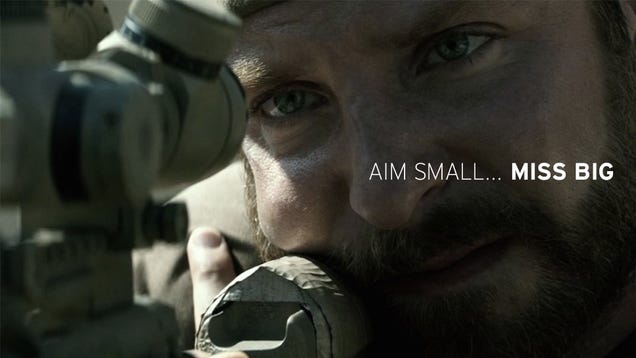![Little Victories, Big Losses: How and Why American Sniper Fails]()
There is a point, about a third of the way through American Sniper's conventional narrative, where a different kind of war movie threatens to break out. SEAL sniper Chris Kyle is dropping Iraqi bodies left and right. He is protecting colleagues, but opening a wound on himself. It is not a glorious sacrifice. He seems to wonder how many more he will have to kill.
In a perfectly watchable movie full of triumphal and nostalgic moments, this is the only moment in which our hero comes close to a broader critical assessment of his lot. It mirrors the famous fleeting moment of introspection once displayed by Kyle's sometime boss, Defense Secretary Donald Rumsfeld, in a memo written as Iraq turned shitty in late 2003:
Today, we lack metrics to know if we are winning or losing the global war on terror. Are we capturing, killing or deterring and dissuading more terrorists every day than the madrassas and the radical clerics are recruiting, training and deploying against us?
As with Rumsfeld, movie-Kyle's pangs are brief, and understandably so. There are Marines to protect, and bad men to protect them from. On with the show.
Clint Eastwood went to theaters with the movie he had, and that movie is not the best he could have fielded. Less campy than Heartbreak Ridge, his goofy paean to the post-Vietnam Marine Corps, and more deadly earnest than Unforgiven, his superior meditation on lethal men who do wrong things for the right reasons, American Sniper pulls its punches. It doesn't simply take artistic license with Kyle's story, a paper narrative that was already squeezed through a moral and political wringer. The film infuses that story with a sentimentality that tries mightily to evade political divisions. In doing so, it couldn't be more political.
The greatest failure of American Sniper is that it is not the sort of film that can change the tenor of that discussion after you have seen it.
It is a peculiar but immutable feature of our American system of free speech that we expend so much of our speech trying to silence other speakers. The left and right have both tried to use American Sniper to shut down a conversation, rather than open one. The left says Kyle, who killed as many as 255 Iraqis before a troubled veteran killed him on a Texas shooting range, was too reprehensible in life to deserve filmic treatment and pop-deification as a hero. They claim he cashed in on his homicidal, possibly racist, almost-certainly exaggerated exploits to become a well-compensated celebrity. "I haven't seen American Sniper, but correct me if I'm wrong: An occupier mows down faceless Iraqis but the real victim is his anguished soul," left fire-eater Max Blumenthal tweeted on Christmas, as the film premiered.
So unless you're going to call him a sociopath, shut up about Chris Kyle, already.
The left's calculation of heroism is disturbingly simplistic. So is the right's. Conservatives say no one deserves the right to criticize a dead hero who did the hard work so few are willing or able to perform in our free, easygoing society. To trash "the man in the arena" is ungratefulness at best, treason at worst. Theirs is part of a larger pattern of talking about war that we've adopted in the post-Vietnam, all-volunteer era: If you're not a veteran, shut up. If you're a vet who didn't serve downrange, shut up. If you were downrange but not infantry, shut up. If you were infantry but didn't kill or see killing, shut up. If you were combat-hardened but not a special operator, shut up. "You are such a white hippie. If you feel so guilty go over there and spread your legs," one conservative tweeter responded to Blumenthal, goaded on by a Michelle Malkin-founded website that highlighted "left-wingers" who were "bad mouthing the runaway hit American Sniper."
So unless you're going to thank him for your freedom, shut up about Chris Kyle, already.
Even before the film enjoyed a wide release, critics and defenders emerged without having seen it to tell others what to think about it. The greatest failure of American Sniper is that it is not the sort of film that can change the tenor of that discussion after you have seen it. It takes no overt position on the big issues, instead stuffing the senses silly with misty minutiae. "Aim big, miss big," a sniping instructor tells young Kyle, explaining to him how to focus more narrowly to hit a more precise target. "Aim small, miss small." Eastwood makes his film according to that advice. So much that is worth questioning in Kyle's world is left as background scenery, treated as natural facts of life rather than the consequences of men's decisions. His universe is small, indeed.
Here is what I mean: The movie starts with a black screen and the sounds of a Muslim muezzin's call to prayer, accompanied by ominous string chords, before opening on a scene in Iraq. Minutes later, it flashes back to a prepubescent Kyle, being lectured by a gruff father about how the world is made up of sheep, wolves, and shepherds. Both of these flashes are timeless war-story memes, as evidenced by their lampooning in 2004's Team America: World Police. If Eastwood were more familiar with that film's lecture on the "pussies, dicks and assholes" that make up humanity, a decade ago, perhaps he would have omitted Kyle's father's painfully Hobbesian monologue.
By the time Kyle has his flashes of war-weariness, in Iraq deployment No. 1, we have already seen him abandon rodeo for the SEALs after watching the 1998 embassy bombings on TV. (This was not the real Kyle's experience; it is one of many artistic creations.) He has charmed a gruff, cynical woman into a happily traditional marriage, after holding her hair while she vomits liquor she cannot handle. (He proposes in bed, informally, his powerful forearm and G-Shock Ironman watch cradling her heaving chest.) He has watched with her as the Twin Towers fell, and celebrated on the weatherdeck of a yacht with his teammates as their deployment orders come in during his own wedding. "Just got the call, boys. It's on," their team leader shouts above the cheers and toasts, an eye-rolling homage to the graduation-ceremony scene from Top Gun.
So much that is worth questioning in Kyle's world is left as background scenery, treated as natural facts of life rather than the consequences of men's decisions.
Kyle "pops his cherry" by killing a militant woman and her son (another embellishment; the child is not shot in Kyle's memoir); thereafter, he is an idealized version of America's warrior elite, down to his consumptive choices. Besides the G-Shock, he wears Carhartt jeans, Champion athletic gear, and a Bowtech hat. He drives a Ford supercrew that would make Toby Keith proud.
But beyond the look, this warrior is obnoxious in ways that aren't easily idealized, no matter how the film tries: He "trains up" infantry Marines, helpless babes that they are; he kicks in doors, literally strong-arms civilians into informing for him (and facing death for doing so), proves that even gracious Iraqis are murderous traitors, and plans entire ops around revenge for fallen comrades, with predictably unsatisfying results. He tussles with paper-pushing higher-ups who question whether he's killed civilians; you can tell they're cowardly tools, because they wear the shiny rank insignia of garrison Marines, rather than the matte-finished appurtenances of real field warriors.
We are eventually immersed in the world of film-Kyle, along for the ride in a first-person shooter, seeing his victories as the only ones that matter. There is a relentless pursuit of "Mustafa," his apocryphal Iraqi sniper counterpart. (Is Mustafa a Sunni, since he protects one of Al Qaeda in Iraq's top lieutenants? Or is he a Shiite, since he holes up in Sadr City for the final battle? Ehhhh: He is an armed Iraqi MAM—"military-aged male," what else matters?) There is Kyle's ill-advised, Matrix-like, CGI, 2,100-yard shot to kill Mustafa, which reveals his team's position and leads to a Call-of-Duty-style shootout and evacuation; and, that mission accomplished, there is Kyle's resignation from the Navy and predictably rocky return to domestic life, although the war rages on without him.
Finally, there is the suggested but unseen end of Kyle's life, as he attempts to console other troubled war vets with shooting therapy, and is shot by one—a demise that, like it or not, invites more questions, all of them left unanswered. It was worth exploring more deeply why and how Kyle—an NRA supporter who also coauthored a pop-history on famous American guns—considered shooting the best way to connect with and ease the pain of other service members. It is a missed opportunity that is missed in most artwork about American war: the opportunity to explain how not all veterans are sick, and not all sick veterans are sick in the same ways.
Part of American Sniper's evasions might be explained by the fact that Kyle was alive when the film went into production, but that after he was murdered, it became more of a sappy Tribute To Heroes than a sober retelling of one man's complicated reality. That would certainly explain the tacked-on closing imagery taken from real news footage of his memorial, of U.S. flags of ever-increasing size flying on interstate overpasses as Kyle's hearse zips by en route to AT&T Stadium. This closing is made all the weirder by a poignant and awkward SEAL's funeral scene Eastwood had inserted earlier in the film. In that scene, a blubbering relative of the deceased rises after the 21-gun salute to deliver a jeremiad against the war and its costs. It goes unfinished and ignored by Kyle and the rest. What is the use of it all? Certainly more than that.
"Aim small, miss small." Small victories are what we all aim for, every day, in our small lives—victories at work, with the kids, getting the car repaired, handling a new mortgage. The fighters of our special operations forces are no different, though their small victories often require a greater share of momentousness, courage, fitness, and yes, sublimation and denial, than ours do.
It's natural to ascribe to our small victories a larger significance than they really have. Natural, and dangerous; for how do we answer to ourselves why a string of small successes didn't lead to a greater big-picture outcome? Why couldn't we prevent a divorce, even after scaling back our office hours? With his workout regimen, how come Dad couldn't have five more years? If our soldiers were so good, why didn't we win that war?
In America, in martial matters, the warrior is never the problem. And so, in reconciling the warrior's little victories to our bigger failures, we tend to settle on some version of the old Dolchstoßlegende: Our brave soldiers were screwed on the home front by doubting thomases, craven politicians, and traitorous critics. The result is a feedback loop in which a society starves for narratives about the wars waged in its name but demands that they come from only a tiny, narrowly qualified warrior aristocracy. We tend to privilege the experiences and insights of the veterans, no matter how narrow the experiences or untested the insights. It's difficult to blame a handful of SEALs and Green Berets for delivering those earnest narratives, and profiting decently. The only valid question to ask a hero becomes: Since you are invincible and faultless, who and what prevented you from being more heroic?
There's nothing wrong with all of this as vicarious entertainment; it has deep resonance for plenty of us who did work downrange. It worked brilliantly in Heartbreak Ridge, a cornball action-comedy at a time when America's civil-military relations needed a little levity. But American Sniper is a truer-than-true "true story": where Kyle told his own story in the book, embellishments and all, this even-more-embellished narrative tells Kyle's tale from a God's-eye view, objectifies and naturalizes him and the events it depicts. It is a small stretch—one easily gapped by a certain kind of political ideologue—to tout American Sniper not just as how one director interpreted one man's limited perspective on war, but as a True Story About The Way Things Are, a broader comment on war itself.
In reconciling the warrior's little victories to our bigger failures, we tend to settle on some version of the old Dolchstoßlegende.
"Guess what? In my experience having visited Iraq a number of times during the war, Clint Eastwood, the movie's director, is telling it like it is," writes Max Boot in a Commentary review of the film titled "American Sniper and the Truth About Iraq." That's Max Boot, M.A. Yale '92, a bestselling neoconservative war cheerleader who never served, but who famously raved in print about the iced lattes he sampled on his long, perilous tours of coffee shops "inside the wire" at American bases in both Iraq and Afghanistan.
It's good that we should encourage veterans to tell their stories. It's bad that we should hammer them all into identical vessels to hold the same "objective" truths, as determined by brave epistemological philosophers like Max Boot.
It is a mistake we will keep making as a society, long after Sniper and Kyle and Eastwood are forgotten. Because we will keep telling ourselves the same stories about ourselves; because we will keep trying to shut up each other's disruptive, complicating opinions; because otherwise, what is the use of it all? Aim big, miss big.





















